
quantumcorespacealchemyst - 4-2-2015 at 17:54
I did some experiments with a little mercury and am a little puzzled by the results.
I boiled some mercury in sulfuric acid. It boiled down, and the mercury grayed, got a little whitish. More H2SO4 added and boiled down some until no
efficient/further reaction was noticed. Pyrosulfate was the aim. After this a salt/double salt with borax was attempted from the mercury and mercury
compounds in the vessel. A little borax was added and heated. It bumped more than I liked and I decanted it, washed it and decanted into the 1st
decent. Original mix boiled down and spot heated with torch a bit to see if further contact with heat changed it. It was clear while boiling down. It
became a bubbly solid. It was powdered and put in a yogurt cup with water. It was amber brownish on reconstitution and let crystallize by a window.
The crystals were white on top and fluffy/non dense/powdered easy, with yellow on parts of them as time passed. The clear brown crystals turned out to
be filled with a brown insoluble and transmitted blue light from computer monitors but regular yellow light from light bulbs.
Finally deciding to break up mass and separate components and further purify. the white crystals/fluff broke apart non intact, turning to powder more
than I expected/hoped clung on more than expected. In all only some white fluff was separated pure from the clear/brown crystals. There was some
yellow on the clear crystals (mercury ii sulfate it seems) and the clear brown crystal was partly insoluble in water, with brown/dark grey powder
(mercury I sulfate it seems) falling to the bottom. the crystals were washed to get the powder separated and more of them dissolved with further
washes
one of the washes which had some of the clear crystal dissolve in it and had some brown precipitate was mixed with some iodine salts/compounds (mostly
iodide, it seemed, with iodate and hydroxide i thought) that formed a vibrant orange precipitate.
the brown powder seperated from the washings has turned progressively white on standing and the majority of the partly soluble crystals are sitting by
the window to recrystalize. i seperated a relatively pure part of te clear crystals and recrystalized them, the do not seem to show the light
filtering effect. there are some peices i saved from the first seperation, some chalky/powdery masses with yellow crystals on them and one chalky
white piece, pure of yellow on top of a clear crystal, with a small clear crystal broken off.
the orange precipitate is presumably mercury ii iodide, i forgot that it is orange, not red.
what puzzles me is the stuff from the cup.
1
the fluffy/crystalline crystals in the photo seem to be mercury ii sulfate. the yellow seems to be the same. why they are not the same color and if
they are actually the same compound, i don't know. according to http://en.wikipedia.org/wiki/Mercury%28II%29_sulfate
"Mercury(II) sulfate, commonly called mercuric sulfate, is the chemical compound HgSO4. It is an odorless solid that forms white granules or
crystalline powder. In water, it separates into an insoluble sulfate with a yellow color and sulfuric acid.[4]" 4 being "Lide, David R.
(1998). Handbook of Chemistry and Physics (87 ed.). Boca Raton, FL: CRC Press. pp. 5–19. ISBN 0-8493-0594-2" edit: in the data page, it says the
yellow solid is subsulphate, doesn't give a formula.
2
the clear crystals. they were partly dissolved when washing them of the brown powder. the solution they were in was mixed with the sodium iodide. the
amount of brown powder in it, i recall as being negligable, being the stuff that was lost by decanting.
3
mercury i sulfate is said to be a "white, pale yellow or beige powder" and/or "whitish-yellow crystals" according to http://en.wikipedia.org/wiki/Mercury%28I%29_sulfate
the brown precipitate is an unknown. and it is turned/turning progressively white from the middle out, being a brown color, "light
beige" on the rim. i remember i read beige on the mercury I sulfide page and thought, i guess that it could be it, even though it was brown/darker
than the rim stuff is now. Also yellow would seem to mean it is close to yellow/beige meaning the yellow crystals mentioned earlier are possible
mercury I sulfate (meaning mercury subsurface and mercury I sulfate are the same possibly).
Nonetheless, the brown compound is puzzling and while it may be an impurity from the borax, it doesn't make sense then why it is insoluble and in the
amount that it is (borax is relatively pure, I thought)
in one picture The brown powder is shown after swishing and settling before separating from clear crystal (slightly visible at top, although their
transparency is not apparent)
After repeated processing, the final brown powder was let settle/dry and now is in the other picture. The others are of the original crystallization
and the mercury ii iodide.
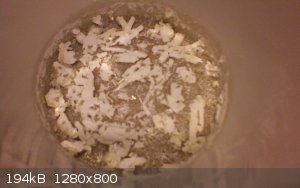
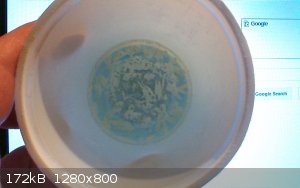
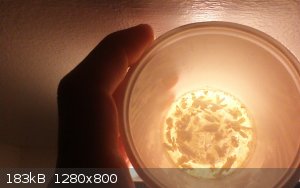
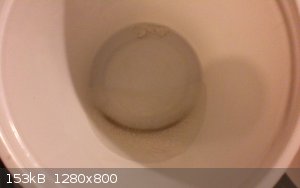
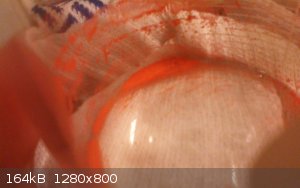
i made this brief title post on the fly to link from the "Pretty Pictures" thread. then came here to post the details and saw i was still able to
edit. my computer was glitching, and it took a while to type part of this, i posted and then i switched computers to finish. i take the pictures on
the tablet but it was overheating so once i got those on, i finished typing.
[Edited on 5-2-2015 by quantumcorespacealchemyst]
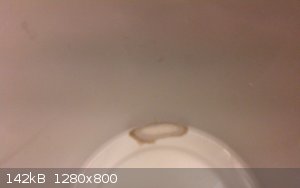
these are the powdery white crystals with yellow (and some clear) crystals and one piece I was able to separate of the white mass that had no yellow
and was attached to clear crystal (there is a crystal fracture of clear crystal there to)
[Edited on 5-2-2015 by quantumcorespacealchemyst]
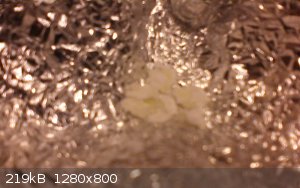
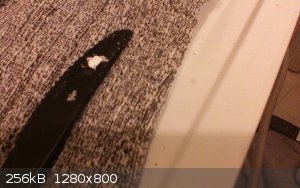
[Edited on 5-2-2015 by quantumcorespacealchemyst]
This is the decanted mercury from the beginning part
After washing once with distilled water.
[Edited on 5-2-2015 by quantumcorespacealchemyst]
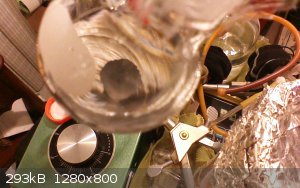
[Edited on 5-2-2015 by quantumcorespacealchemyst]
Mailinmypocket - 4-2-2015 at 18:00
Be more specific. We have no idea whatsoever about what the heck you did... We can't read your mind.
TheChemiKid - 4-2-2015 at 18:00
Why are you posting this?
Zombie - 4-2-2015 at 18:02
It's your puppy...
MrHomeScientist - 6-2-2015 at 13:01
If you're going to haphazardly and randomly mix reagents together and heat them for no discernible purpose, you're bound to get inexplicable results.
Doing this with toxic materials like mercury and arsenic is an even worse idea.
j_sum1 - 6-2-2015 at 16:10
I must say I concur with MrHomeScientist here. Let me count the species you have.
- mercury
- sulfuric acid
- borax
- iodide
- iodate
- plus presumably water, oxygen from air, a handful of spectator ions (which might be doing more than spectating) and whatever impurities you have
from what sounds like chemicals you have synthesised yourself.
It is little wonder you end up with a mixture with some species you can't identify.
I have to say, I marvel at some of the experiments you do, quantum. On the one hand you play with some (to my mind) exotic reagents -- gold, aqua
regia, tellurium, selenium, platinum, and now mercury and pyrosulfates. You take some very interesting looking pictures. In the other hand, when I
read you write-ups, I don't see a clear sense of direction and I have no idea what you intend to accomplish with each step that you take. It's either
brilliant or aimless and I can never work out which.
I wish my lab was as well stocked as your appears to be. But I think if it was then I would be on a long slow trip working out the properties of all
those exotic chemicals.
quantumcorespacealchemyst - 15-10-2015 at 21:24
it tuns out, the H2SO4 i was using was 2N, nowhere near the 98% o 95% i thought i had (wrote one o those somewhere). that explains my constant
puzzlement about it's peculia properties and failed reactions.
